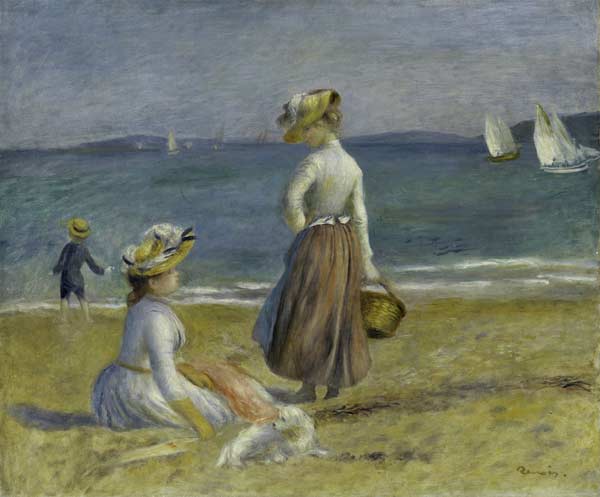The Met curator one of 7 new CNAP fellows
Updated: 2014-03-25 17:38
By Lin Qi (chinadaily.com.cn)
|
||||||||
 |
|
Figures on the Beach, by Renoir, from Metropolitan Museum of Art. Photos provided to China Daily |
Zhixin Jason Sun, a curator at the Metropolitan Museum of Art, said he hopes to introduce more Chinese contemporary art to the US audience, at a ceremony where he became an overseas researcher for the China National Academy of Painting on March 21 in Beijing.
Sun received his appointment certificate with another six fellows, all of whom are French artists, including Remy Aron, president of the Maison des Artistes; and Paul Andreu, who designed the National Center for the Performing Arts.
Sun comes from the Met's Department of Asian Art, which boasts a prestigious collection of classic Chinese art.
The Met has mounted several exhibitions featuring ancient Chinese culture and is currently showing Ink Art, its first exhibition of Chinese contemporary art. The works by leading Chinese contemporary artists such as Gu Wenda and Xu Bing are juxtaposed with classic Chinese art displays to conduct a dialogue between the past and present.
"The culture has continuity," Sun said. "Research about the Chinese culture should not only focus on the ancient civilization, as it has also imposed far-reaching influences on modern culture."
Sun said the Met is considering the possibility of rearranging the research territories of the departments of Asian Art and Modern and Contemporary Art, so the two departments can collaborate on more exhibitions.
The Met presented Earth, Sea, and Sky: Nature in Western Art, which displayed its art holdings, at the National Museum of China early last year. The exhibition teamed collections from 12 curatorial departments, who seldom collaborate.
"The exhibition has been quite a rarity in the Met's history. The director had to force several curatorial departments to contribute their first-tier collections, which refers to those permanent displays in the exhibition halls," Sun said.
"The Met wants to present the best of what we have. And I am not sure whether we will come up with a similar exhibition ever again."

 Gorgeous Liu Tao poses for COSMO magazine
Gorgeous Liu Tao poses for COSMO magazine
 Post-baby Duchess
Post-baby Duchess
 Victoria Beckham S/S 2014 presented during NYFW
Victoria Beckham S/S 2014 presented during NYFW
 'Despicable' minions upset Depp's 'Lone Ranger' at box office
'Despicable' minions upset Depp's 'Lone Ranger' at box office
 'Taken 2' grabs movie box office crown
'Taken 2' grabs movie box office crown
 Rihanna's 'Diamonds' tops UK pop chart
Rihanna's 'Diamonds' tops UK pop chart
 Fans get look at vintage Rolling Stones
Fans get look at vintage Rolling Stones
 Celebrities attend Power of Women event
Celebrities attend Power of Women event
Most Viewed
Editor's Picks

|

|

|

|

|

|
Today's Top News
New centers to boost US-China ties
China-US 'sister' ties in full bloom
AALDEF to honor Chinese-American lawyer
Charles Yang integrates the violin into modern music
US first lady says embrace similarities
Angry relatives of lost 370 victims demand answers
Xi says China strengthens its nuclear security system
Judge makes history in Maryland
US Weekly

|

|









